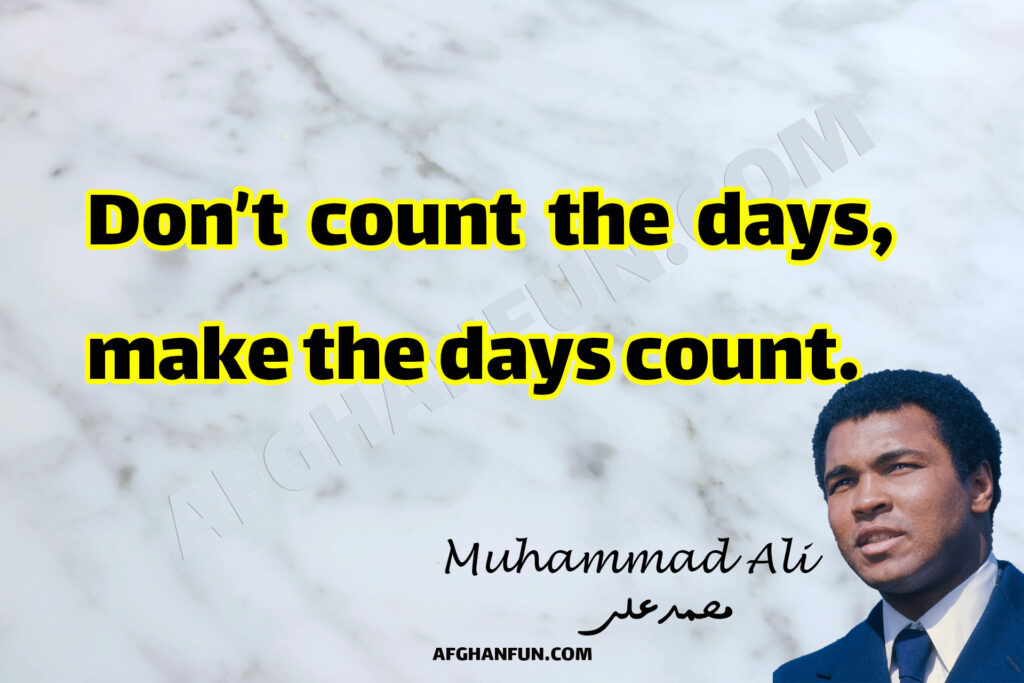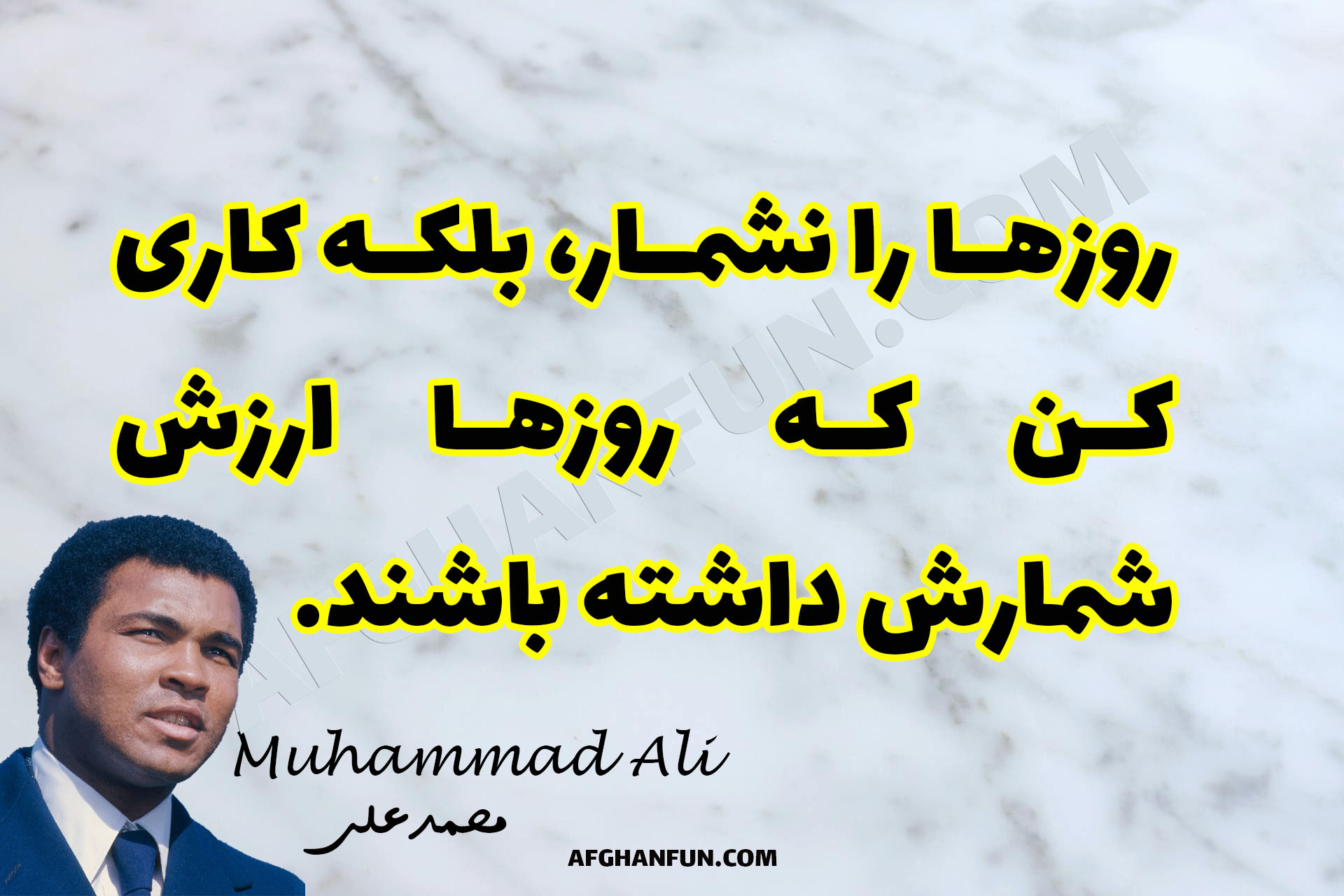
Don’t count the days, make the days count.
Muhammad Ali
Рӯзҳоро нашумор, балки кори кун, то ки рӯзҳо арзиши шумориш дошта бошанд.
Муҳаммад Алӣ
Ин ибора ба мо мегӯяд, ки ҳаёт танҳо як маҷмӯи рӯзҳои такрорӣ нест. Ҳар рӯз як имконият аст барои рушд, омӯзиш ва эҷоди тағйироти мусбат. Ба ҷойи он ки ба таври механикӣ рӯзҳоро паси сар гузорем, бояд кӯшиш кунем, то ҳар рӯзро ба ёд мондани ва арзишманд кунем. Ин ибора моро ба самти ҳадафгузорӣ ва анҷом додани корҳое, ки ба мо маъно медиҳанд, ҳидоят мекунад.
روزها را نشمار، بلکه کاری کن که روزها ارزش شمارش داشته باشند.
محمد علی
این جمله به ما میگوید که زندگی صرفاً مجموعهای از روزهای تکراری نیست. هر روز یک فرصت است برای رشد، یادگیری و ایجاد تغییرات مثبت. به جای اینکه به صورت مکانیکی روزها را پشت سر بگذاریم، باید تلاش کنیم تا هر روز را به یادماندنی و ارزشمند کنیم. این جمله ما را به سمت هدفگذاری و انجام کارهایی که به ما معنا میدهند، سوق میدهد.
لا تحسب الأيام، بل اجعل الأيام تستحق الحساب.
محمد علي
هذا القول يدعونا إلى عدم الاكتفاء بمرور الأيام بل إلى جعل كل يوم يستحق العيش، أي أن نجعل لكل يوم قيمة ومعنى. بدلاً من مجرد عيش حياة روتينية، يجب علينا أن نسعى لتحقيق أهدافنا وأن نقوم بأعمال تضيف قيمة لحياتنا.
Muhammad Ali’s quote, “Don’t count the days, make the days count,” is a powerful reminder about living purposefully and with intention. It suggests that time is valuable, and instead of simply marking the passage of time or waiting for something to happen, we should focus on making each day meaningful and impactful.
Key Themes:
Living with Purpose:
Ali encourages a proactive approach to life. Instead of passively waiting for things to change or for time to pass, he stresses the importance of making the most of every moment. The idea is to actively contribute, achieve something, or experience growth each day.
Value of Time:
Time is one of the most precious resources we have. Ali’s message is that it’s not enough to simply let time go by without using it in a way that adds value or brings fulfillment. Every day is an opportunity, and it’s up to us how we use it.
Focus on Quality Over Quantity:
The quote also draws attention to the quality of time rather than the quantity. Counting the days may imply an obsession with how much time has passed, but making the days count implies being focused on how you use that time. It’s about making meaningful contributions or experiences rather than just marking off days on a calendar.
Mindfulness and Intentional Living:
Implicit in this message is the idea of being present in the moment and not getting lost in the future or the past. Ali emphasizes the importance of mindfulness, where each day has significance based on the actions and choices you make.
Empowerment:
The quote is also empowering. It puts the responsibility in the hands of the individual to shape their own destiny, to take control of how they spend their time and what they accomplish, rather than being a passive observer of life’s passage.
Personal Growth and Achievement:
For someone like Muhammad Ali—who was a boxer, a fighter both inside and outside the ring—the quote may also reflect his own relentless drive for excellence. He didn’t wait for opportunities to come to him; he made every day count by pushing his limits, improving his skills, and striving for greatness.
In Summary:
This quote is a call to live intentionally, to focus on the present moment, and to use each day as a stepping stone toward your larger goals. It speaks to the idea that time should be used wisely, and that every single day is an opportunity to make an impact, whether it’s in your personal life, your career, or your pursuit of dreams.
Muhammad Ali, born Cassius Marcellus Clay Jr. on January 17, 1942, in Louisville, Kentucky, is widely regarded as one of the greatest athletes in the history of boxing and one of the most iconic figures in sports and global culture. Ali transcended his sport to become a symbol of courage, conviction, and resistance, both inside and outside the boxing ring. Here is a comprehensive look at his life and legacy:
Early Life and Boxing Beginnings:
- Family and Upbringing: Ali was born to Cassius Clay Sr., a sign painter, and Odessa Clay, a household domestic worker. He was raised in a working-class neighborhood in Louisville. As a young boy, he was inspired to take up boxing after his bicycle was stolen, and a local police officer, Joe Martin, encouraged him to learn how to defend himself.
- Amateur Boxing Career: Ali’s amateur boxing career began at the age of 12. He quickly rose to prominence, winning a gold medal in the Light Heavyweight division at the 1960 Summer Olympics in Rome. His victory catapulted him into the spotlight, and he became a national sensation.
Transition to Professional Boxing:
- Turning Professional: In 1960, at the age of 18, Ali turned professional, adopting the name Muhammad Ali after converting to Islam and joining the Nation of Islam under the guidance of leader Elijah Muhammad. He was initially known for his flashy style and brash personality, famously proclaiming he was “The Greatest” even before proving it in the ring.
- Boxing Style and Bravado: Ali revolutionized the sport with his unorthodox boxing style. Known for his speed, footwork, and ability to “float like a butterfly, sting like a bee,” he was a master of psychological warfare. His charisma, wit, and bold proclamations often unsettled opponents and media alike. Ali’s self-confidence was integral to his public persona.
Key Fights and Achievements:
- Defeating Sonny Liston (1964): In one of the most shocking upsets in boxing history, Ali (then still known as Cassius Clay) defeated the heavy favorite Sonny Liston to win the World Heavyweight Championship on February 25, 1964. This victory made him a global star and confirmed his bold predictions.
- The Name Change and Religious Conversion: Shortly after his victory over Liston, Ali announced he had converted to Islam and changed his name to Muhammad Ali. He cited his faith and the teachings of the Nation of Islam, which emphasized black empowerment and self-determination.
- Exile and the Vietnam War: In 1967, Ali refused to be drafted into the U.S. military to fight in the Vietnam War, citing religious and moral objections to the conflict. His famous quote, “I ain’t got no quarrel with them Viet Cong,” became iconic. As a result, he was stripped of his boxing titles, banned from the sport, and faced legal charges. He would not fight professionally for over three years.
- Return to Boxing and the Thrill in Manila (1975): After being reinstated in 1970, Ali returned to boxing and regained the heavyweight championship. One of his most legendary victories was his 1974 bout with George Foreman in Kinshasa, Zaire, famously known as the “Rumble in the Jungle”. Ali used a strategy called the “rope-a-dope” to defeat the undefeated Foreman and reclaim the title. The rivalry with Joe Frazier is also iconic, especially their third bout, the “Thriller in Manila” in 1975. Ali won a brutal, 14-round fight that cemented his legacy as a true champion.
- The Greatest Triumphs: Ali fought and defeated some of the best heavyweights in boxing history, including:
- Sonny Liston (twice)
- George Foreman
- Joe Frazier (three times, including their legendary “Fight of the Century” in 1971)
- Ken Norton (three times)
- Larry Holmes
- Retirement and Comebacks: Ali retired from boxing several times, only to return to the ring. His health deteriorated after his final retirement in 1981, but his impact on the sport remained immeasurable.
Legacy and Cultural Impact:
- Champion for Civil Rights: Ali was not only a boxer but also a powerful voice in the civil rights movement. His refusal to fight in the Vietnam War was a stand against injustice, and his conversion to Islam marked a profound commitment to his own identity and faith. He challenged social norms, racial prejudice, and was unapologetic in his beliefs.
- Philanthropy and Humanitarian Efforts: Beyond his athleticism, Ali was deeply involved in charitable work. He made trips to various parts of the world to spread peace, support charities, and assist those in need. His humanitarian efforts earned him several awards, including the Presidential Medal of Freedom in 2016.
- Health Struggles and Parkinson’s Disease: In 1984, just three years after retiring from boxing, Ali was diagnosed with Parkinson’s disease, a neurodegenerative condition often linked to brain trauma. Ali’s struggle with Parkinson’s affected his motor skills and speech, but he continued to advocate for the disease’s awareness, bringing attention to the toll boxing had on its athletes.
- Global Icon: Ali’s impact reached far beyond boxing. He became a global symbol of defiance, resilience, and pride. His bold statements, magnetic personality, and fighting spirit made him an icon of popular culture, and his influence extended to politics, entertainment, and activism.
Death and Legacy:
- Muhammad Ali passed away on June 3, 2016, at the age of 74, after battling Parkinson’s disease for over three decades. His death was met with tributes from world leaders, athletes, and fans worldwide. Ali’s funeral in Louisville attracted a global audience, and he was eulogized as a transcendent figure who reshaped the world of sports and culture.
Notable Achievements and Honors:
- 3-time World Heavyweight Champion
- First boxer to win the world heavyweight title three times
- Famous fights: “Rumble in the Jungle” (1974), “Thriller in Manila” (1975), and “Fight of the Century” (1971)
- Olympic Gold Medal (1960)
- Presidential Medal of Freedom (2016)
Conclusion:
Muhammad Ali is remembered not only for his extraordinary achievements in the ring but also for his courage to stand up for his beliefs, his advocacy for justice, and his willingness to speak truth to power. He embodied the ideals of self-confidence, resilience, and humanitarianism. To this day, Ali is celebrated not just as “The Greatest” boxer but as one of the most influential figures in the history of sports and social justice. His legacy continues to inspire people around the world to fight for what is right, to be true to themselves, and to never give up.











